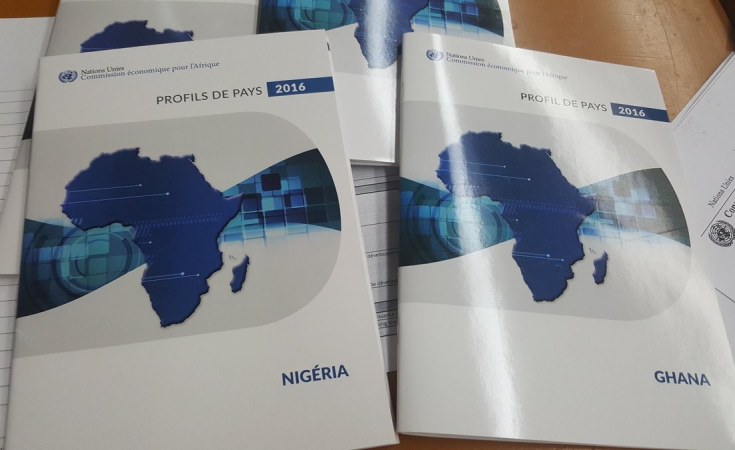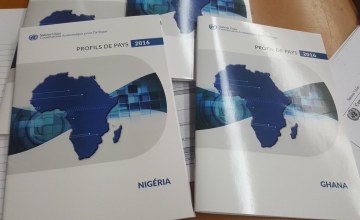Dakar, 26 March 2017 (ECA) - Algeria, Mauritania and Tunisia are faced with several, similar challenges and opportunities including low commodity prices, weak trade with neighbours and high youth and female unemployment, say the Economic Commission for Africa’s (ECA) country profiles (CPs), which were launched today in Dakar, Senegal.
“Although Algeria and Mauritania have resisted drops in hydrocarbon and iron prices, declining terms of trade imply that these countries need, more than ever, to diversify their production to reduce their dependence on primary goods exports” said ECA’s Deputy Executive Secretary for knowledge delivery Giovanie Biha at the launch.
“At the social level, inequality remains one of the main challenges in the three countries. We have also noticed growing issues that may increase national health bills such as obesity or ageing populations”, said Omar Abdourahman, interim Director at the ECA office in North Africa. “In the meantime, while Tunisia has reached gender parity in areas such as education and literacy, much remains to be done to achieve equal employment for men and women.”
Twenty-one country profiles were launched today on the margins of the African Development Week (Dakar, 23 - 28 March 2017), including reports on Algeria, Mauritania and Tunisia in North Africa. The other countries covered by these new reports are Angola, Burundi, Cape Verde, Chad, Central African Republic, Djibouti, Equatorial Guinea, Gabon, Gambia, Ghana, Madagascar, Malawi, Mauritius, Mozambique, Nigeria, Somalia, South Africa and Swaziland.
Similar reports on Egypt, Morocco and Sudan were also launched last year in Addis Ababa (Ethiopia).
The ECA Country Profiles were initially presented in 2015 in accordance with Resolution 917 of the Conference of African Ministers of Finance, Planning and Economic Development (Abuja, 2014), to provide African decision-makers with an independent analysis of their countries’ economic and social development and the progress made to achieve regional integration.
They include several innovations such as:
• The African Regional Integration Index, co-designed by the ECA in partnership with the African Development Bank (AfDB) and the African Union Commission (AUC), and based on the five pillars of regional integration: trade integration, regional infrastructure, productive integration, free movement of people & financial and macroeconomic integration.
• The ECA African Social Development Index (ASDI), which measures human exclusion in six key dimensions of wellbeing throughout the life cycle: survival, health, education, employment, means of subsistence and the capacity to live a decent life after the age of 60.
• The African Gender and Development Index (AGDI), which allows policy makers to assess their countries’ performances in implementing policies against women’s marginalisation and better understand the issues they are faced with as well as their concerns.
Economy
In 2015, the Algerian, Mauritanian and Tunisian economies grew by 3.9%, 3.1% and 0.8%. Between 2013 and 2015, Algeria and Mauritania’s average growth (3.5%) was higher than in the rest of North Africa* (2,5%). Tunisia’s low GDP growth in 2015 was mainly related to security issues, the country avoided negative growth thanks to exceptional olive and date harvests.
In 2015, Mauritania’s growth was mainly due to the good performance of the primary and tertiary sectors, which accounted for more than 68% of GDP.
Inflation remains moderate Algeria, Mauritania and Tunisia.
Although Algeria and Mauritania have resisted the drop in hydrocarbon and iron prices and declining terms of trade, current trends underscore the need to diversify their production in order to reduce their dependence on primary goods exports.
Algeria, Mauritania and Tunisia’s trade with neighbouring countries and economic communities such as the Arab Maghreb Union and the CEN-SAD remains very weak, with most of their key economic partners being Europe, China and the United States.
A single product exporter, Algeria has a strong potential for economic diversification.
Mauritania’s ongoing efforts to invest in electricity production should reduce what is currently a major obstacle to investment in the country.
In addition to targeting new markets, Tunisia could gain from diversifying its offer by investing in areas such as medical tourism.
Social
Between 1966 and 2015, life expectancy at birth has increased from 46 to 77 years in Algeria, from 48 to 63 years in Mauritania and from 48 to 75 years in Tunisia. These countries are now characterised by low or declining fertility rates despite persisting, high child mortality in some countries.
While child stunting is still an issue in Mauritania, new phenomena have been observed in Algeria and Tunisia. They include obesity (13% of children under 5 in Algeria, about one in 6 children in Tunisia) and ageing populations (more than 13% of Algerians expected to be over 60 by 2030, more than 19% of Tunisians to be over 65 by 2039).
Youth unemployment remains a common, growing issue in Algeria, Mauritania and Tunisia.
Cases of perfect gender parity in literacy and access to education in Tunisia and higher female than male presence in Algerian and Tunisian universities illustrate overall improvements in women’s education. However, higher female unemployment rates across ages show that more could be done for the three countries to optimise benefits from investments in women’s education.
For more information about the ECA country profiles, please visit: http://www.uneca.org/publications/country-profiles.
* Algeria, Egypt, Libya, Mauritania, Morocco, Tunisia, Sudan.
Issued by:
Communications Section
Economic Commission for Africa
PO Box 3001
Addis Ababa
Ethiopia
Tel: +251 11 551 5826
E-mail: ecainfo@uneca.org



